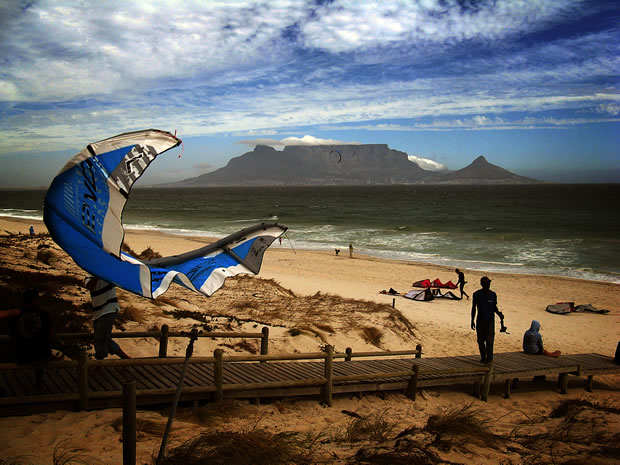
Three Weeks in Cape Town. March 2010 by John Baxter
Visiting Cape Town today where I was born and left for England in 1967 is a moving experience. I find the city and the whole surrounding Western Cape achingly, painfully beautiful. Today the air is crisp and clear, the light sharp and it reveals a landscape that is simply stunning. Anyone who has not been here cannot imagine how majestic and inspiring the mountains of the Cape are; Table Mountain, Devil’s Peak, Lion’s Head, the Helderberg and the whole range called the Hottentots Holland. Wherever you are they loom up and dominate or rise up on the horizon, ancient, mythic, glowering and glowing.
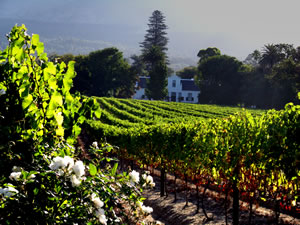 A Vineyard in Constantia
A Vineyard in Constantia
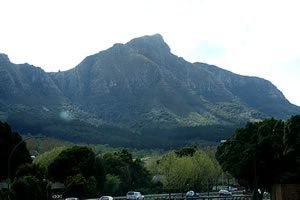
We fly into Cape Town on the day President Zuma brings his third wife on a State Visit to the UK. He flies into London with a large retinue in his presidential Boeing 737. He comes to meet the Queen and lobby Gordon Brown. He wants the PM to lift sanctions against the Zanu PF “elite” who keep Mugabe running Zimbabwe while they pillage and terrorise its people as they lay waste the country’s rich resources for their own private gain. Gordon Brown demurs.
President Zuma. (Google images)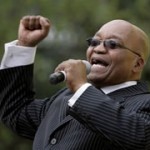
Yet one is distracted from such grim tidings by the beauty of Cape Town with its unique and magically varied flora and fauna – particularly the birds, its clean white beaches, and its rocky and boulder strewn coast festooned in the serpentine seaweed kelp. Then there is the rugged wild fynbos, century old oak trees, towering blue-gums, enormous manicured vineyards and carefully tended orchards. Everything conspires to overwhelm and fascinate. The city itself looks rich and modern.
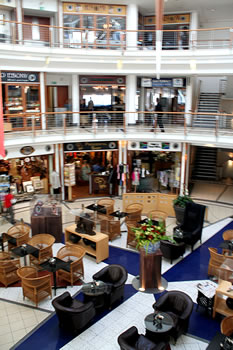 “Downtown” is almost American with high rise city centre office blocks, opulent shopping malls and a sweeping selection of cantilevered highways along which the latest Mercs, Hondas, BMW’s and four by fours swish aggressively . Yes, it is Africa – but an Africa that seems light years away from the broken backed squalor and inefficiency that increasingly seems to characterise the cities beyond South Africa – Lagos, Maputo, Harare. Things clearly work here, and yet …..
“Downtown” is almost American with high rise city centre office blocks, opulent shopping malls and a sweeping selection of cantilevered highways along which the latest Mercs, Hondas, BMW’s and four by fours swish aggressively . Yes, it is Africa – but an Africa that seems light years away from the broken backed squalor and inefficiency that increasingly seems to characterise the cities beyond South Africa – Lagos, Maputo, Harare. Things clearly work here, and yet …..
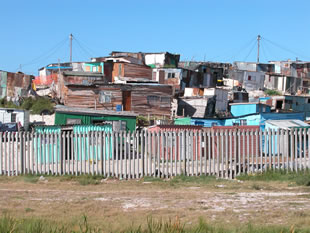 “Informal Settlements”
“Informal Settlements”
For the first time visitor the drive from Cape Town’s sumptuous new state of the art airport into the city brings a shock. Mile after mile on either side of the motorway are shacks of rusty tin and plastic sheeting perched on sand. Clearly some near the road have been replaced by small, simple houses of a set design, though even around these more shacks crouch and crowd. These shacks persist and grow in number by the day revealing the existence of lives of such poverty and desperation as to be beyond the capacity of most of us who inhabit the “developed” world to imagine, let alone empathise with.
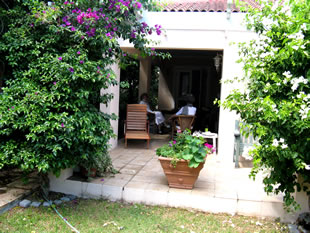 At Home in Tokai
At Home in Tokai
The scene changes as we sweep on into Cape Town and its reassuringly green and well-tended suburbs such as Rondebosch, Constantia and Tokai. Everywhere we pass beautiful homes and manicured gardens. There is however something different about them compared to similar homes in Britain. They are all surrounded by eight foot high walls and many of these are topped with high voltage wire or at the least razor wire or spikes. What is more outside each home there is a warning sign that the property is protected by armed response.
On the day we leave South Africa, three weeks later, the country is celebrating Human Rights Day. It is the 50th Anniversary of the Sharpeville massacre, the day in 1960 when the police of the apartheid regime opened fire and killed 69 people and wounded 180 as they took part in a peaceful protest. Three days before In the annual Human Rights Day debate in the South African Parliament instead of the usual congratulatory speeches about the peaceful passing of apartheid, opposition members protest against the high handed behaviour and arrest of a journalist and a photographer by Zuma’s security guards. The guards do not want pictures of his opulent “blue light” motorcade and the questionably financed mansion of one of his mistresses to be published.
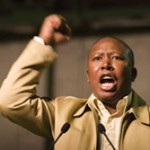 Julius Malema ( Google Pictures)
Julius Malema ( Google Pictures)
The MPs also deplore the behaviour of Zuma’s cheerleader Julius Malema, the arrogant and loquacious head of the ANC Youth League. He seems increasingly contemptuous of the rule of law. A few days earlier he was found guilty by a Johannesburg magistrate of abusive “hate Speech” for singing a song about “killing the boers” even as a frightening number (around 3,000) of Afrikaner farmers are murdered on their land. He treats the judgement against him with contempt and lodges an appeal.
A Remarkably Free Press
How do we know all this? Because one of the best things about the New South Africa is that it has a remarkably free press ready to expose and criticise the actions of government relentlessly – even if the broadcast media keep criticisms muted. Papers like the Cape Times and the weekly Mail and Guardian give us a picture which is however depressing. Starting with Zuma and working down the news stories tell of widespread arrogance, incredible wasteful incompetence, black racism, routine bribery and endless accounts of corruption. This appears to be carried out on a massive scale by a self-serving “elite” consisting of politicians and their cronies. These people it seems are intent above all to live lives of ostentatious luxury and indolence – where possible at public expense. This happens even as the “informal settlements” as the slums and shanty towns are euphemistically called, grow ever bigger, and the country’s infrastructure – and particularly access to water and electricity , health care and education, justice and the law all become increasingly hard to come by, particularly for the poor, AIDS sufferers (5.5 million. World’s largest proportion) and the millions who try to exist without jobs. (up to around 40%)
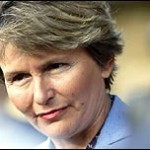 Helen Zille , Premier of the Western Cape(Google Picture)
Helen Zille , Premier of the Western Cape(Google Picture)
A second source of hope is the Opposition lead by Helen Zille. She is multilingual, married to a professor of Economics and started out as an anti-apartheid journalist. It was she who exposed the murder under interrogation of Steve Biko in the dark days. Surprisingly for a leading politician in SA today, she is also white. With the advent of the New South Africa, she went on to enter local politics and become a very effective mayor of Cape Town, then an MP and now Premier of the Western Cape. She speaks out fearlessly and sensibly about Government corruption and high handedness and is reported almost daily in the Cape Times. In Britain her values and policies would be called liberal – sadly a term of abuse for the ANC – and she stands for all the basics, human rights, women’s rights, the rule of law and an independent judiciary. She is anti-racist, respects all cultures and religions, campaigns against drug misuse and for efficiency and transparency. Against her is the largely Xhosa ANC which has an overwhelming majority in the rest of the country and who have encouraged millions of penniless Africans, again mainly Xhosa, to move from the Eastern Cape and the rest of the country to settle in bleak locations in the Western Cape. Here they have no roots and find it very difficult to find jobs, but it was done so they might form a majority for the ANC in the one area of the country which does not have a traditional black African majority and which it has failed to capture.
There are however signs that many ANC supporters are getting increasingly disillusioned by the behaviour of the “elite” and Zille’s party, the Democratic Alliance, is increasing its vote and working to unite with other opposition groups to stand against the ANC in the next round of provincial elections.
The Current Great Divide
Clearly South Africa is facing huge problems. Under apartheid the great divide was between legally enforced white wealth and privilege and non-white subservience and poverty. Now those legal and political barriers are down and they seem to have been replaced by another set every bit as divisive and dangerous. This is the gap between those who can afford “security” be they white or black, and those who cannot. Now the gap is between those with a “developed world” life-style and those who have almost nothing, between those with a house and a car, some education and a steady job who can afford “armed response protection” and those who cannot.
Khayelitsha
Stretching out across the Cape Flats as far as the eye can see in every direction is the enormous township of Khayelitsha (Xhosa for New Home) where some 704,000 people live, the majority in “informal settlements”. It is the largest township in South Africa and conditions for most people there are quite appalling. The provincial administration is trying hard to introduce a sewage system to those areas without one, but the growth of more “informal settlements” is relentless.
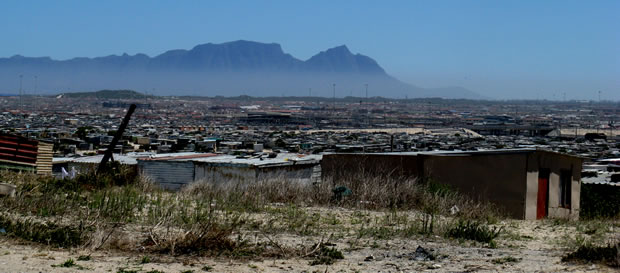
One thing unites the people of Rondebosch, Constantia and Tokai and those of Khayelitsha, and that is fear of and vulnerability to violent crime, only for those in Khayelitsha the chances of being a victim are far higher. It is generally acknowledged that South Africa now has the highest rape rate in the world – except possibly for places suffering unending conflict like the Congo. It is also estimated that one murder is committed every thirty minutes. Male gangs high on drugs are the main perpetrators and their disregard for life – their own and that of their victims – make them doubly dangerous.
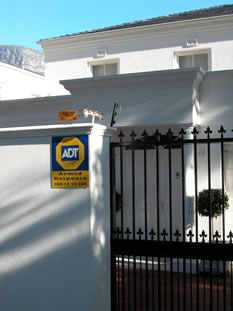
Is there some basic cause for this? Certainly in most cases the crimes are not racially motivated because the great majority of victims are black, still the extreme violence of some show signs that they may well be. More likely most crimes are the almost inevitable product of the huge and very visible difference between the life-styles of the haves and the hopelessness which so many who have nothing experience. Certainly the result is a prison population of 166,300 out of a population of 48 million. This means the South African incarceration rate as a proportion of the population is one of the highest in the world – yet this has not reduced the crime rate. It also means conditions in the prisons are dire and deteriorating, a recipe for re-offending. The Government response to this, particularly in the face of the coming World Cup Football Competition ( which is dependant for its success on foreign visitors,) is simply to stop publishing statistics, together with a policy of the police under-reporting crime. As a result no-one can be sure what is happening.
The preparations for the World Cup are a good example of ANC hubris and incompetence. Vast magnificent stadia have been built – one in Cape Town. These are many miles from the homes of the near penniless supporters of the game and are bound to become costly white elephants once the event is over. What is more all the marketing that goes with the games, the trinkets and tee-shirts, strip for supporters, souvenirs and flags are not made in South Africa -but in China. This is a result of contracts which involve payments to the “elite”. It now looks as if this exercise in national flag waving by a country unable to produce anything like a world class football team may simply be to saddle the economy with considerable debt.
Yet so much about the country is good and Mandela’s example continues to shine and inspire people of every race. The overwhelming impression one gets is still of optimism about the future, pride in being South African and of good will to all. The old servility has gone, replaced usually with friendliness and courtesy. After twenty years the present young do not remember living under apartheid and there are a significant number of educated and experienced “black” men and women in business and the professions who have proven ability. The problem is that their paths to posts of real influence are often blocked by the much less competent survivors of the “liberation struggle”and their cronies determined to hang on to power and privilege.
“Positive Discrimination.”
Another brake on competence and efficiency is the treatment of young white South Africans and white owned businesses. Initially understandable after the ravages of apartheid which excluded those who were not white from opportunity, twenty years later the country is still saddled with a complicated system of “positive discrimination.” As regards employment this means there is now no “level playing field” which is why so many young South African whites are to be found in the UK, Australia and Canada. Despite being full citizens all whites find that if they apply for a job any black candidate who can claim some qualification can always expect to be given preference. (Remember black in the South African context means anyone not white that is African, coloured, Asian Japanese or – significantly – Chinese.
A possibly unintended consequence of this system is that it puts up the going rate for well qualified black candidates – for in many fields such as accountancy they are still rare. A common consequence is that it results in the appointment of the relatively or completely incompetent who front the job while a white on a lower rate with the necessary training and experience does the actual work. Worst of all are those cases where an under qualified incompetent bumbles along causing chaos. (See dramatic examples of what has been happening in many rural municipalities where accounts have not been kept and water and sewage services have deteriorated to the point where they are now facing rate payer revolts.)
Tenderpreneurs
Then there is the huge problem of “tenderpreneurs”. This ugly and widely used local neologism relates to those members of the “elite” who become wealthy through obtaining government contracts or “tenders”. This they can do perfectly legally as a result of the Preferential Procurement Act whereby any HDI (Historically Disadvantaged Individual i.e. someone not white) who puts in for a government contract gets scored in the bureaucratic bidding process far higher than any white owned business. This means the “elite” member can demand of a client who approaches them – even if it is an overseas business in China, a hefty “consultancy fee” or local directorship in return for fronting the contract. This provision enriches the “elite” individuals –such as Zuma’s many wives and family members, while denying local South African companies the chance to compete – so losing money and jobs to foreign companies.
Rugby Religion
Faced with all this do I have any other grounds for hope then? A small sign which seemed significant was watching rugby on TV. Rugby has long been the “religion” of white and Afrikaner South Africans, but I was surprised to find how far it has also become the game of choice for many African and coloured South Africans. Watching multi-racial teams compete in professional games playing extremely good rugby seems an inspiring model for the future. South African TV also shows a lot of inter-school rugby. This is between schools which are all racially mixed and who play each other with a spirited skill and competitiveness which I also found an inspiring model of how things should be in the world beyond sport.
Still, after the optimism of the Mandela years all the reports of corruption, greed and duplicity engender a mood of despondency, a fear that the country is simply drifting at a dangerous time and in the face of huge problems. Certainly it is saddening and easy to predict a depressing future scenario, particularly when one looks at what has been happening around the rest of Africa.
The High Tech Challenge
The fact is modern technology while producing high productivity demands a competent and skilled work force of managers and staff if it is to work to deliver services and produce profit. Sadly it provides little opportunity for the unskilled and the slow who find using it difficult. They can quickly become economically redundant.
A dramatic illustration of this has been seen in farming which has certainly become a high tech occupation. Here the behaviour of Mugabe in dispossessing efficient and technically competent white farmers and their skilled and well- trained workers and replacing them on the land with “war veterans” has resulted in famine in what was “the grain basket of Africa.” A limited scheme in South Africa to buy farms from whites and replace them with blacks has also resulted in the Government having to recognise that the output from such farms has fallen by 90%. This means if the scheme were extended South Africa could be facing serious food shortages.
Then there is what has happened at ESCOM the South African electricity provider. Replacing able managers and engineers, mostly white, with blacks connected to the “elite” has resulted in a failure to plan for the future or maintain plant for the present. Suddenly the country has been subjected to massive power cuts and now huge price rises are about to be imposed as outside and overseas contractors are called in to sort out the mess and no doubt able (and probably white) engineers are recalled to manage the power stations.
What has to be recognised is that a modern economy and developed society is an extremely complex and demanding thing. It can only operate reasonably well if managed by those who know what they are doing backed up by a skilled and disciplined work force. Even then errors will be made. If it is not the whole thing can come crashing down – resulting in social chaos and economic ruin, and this can happen very quickly and where it happens the path to recovery can be slow and difficult. This applies to EVERY element in society, public and private – education, universities, health, business, the law, the police, the army, civil service, the utilities, politics, etc. This means if the present venal and incompetent elite continue to hold the levers of political power and appoint those not best qualified a variety of different crises in different sectors could trigger the slide to catastrophe.
The Future. Dallas or Lagos?
What happened a little while ago in Kenya – formerly regarded as a stable and prosperous state – and what has happened in Nigeria this year when in both countries huge areas suddenly imploded into inter-tribal and inter-religious violence illustrates the point. Not that inter-tribal and inter-religious violence is the top danger for South Africa although the backlash against the influx of Zimbabweans fleeing Mugabe’s rule has been pretty ugly. I would argue instead that if the most able, which includes many young white South Africans, continue to be driven out of their own country because they cannot get jobs because of their race and as places are filled by the relatively incompetent, all elements in society suffer and become less and less efficient until suddenly we can expect a series of systemic collapses which will stop the economy in its tracks and wreck everything – particularly for the poorest.
Of course to change this “affirmative action” culture will be very difficult and unpopular with many in a country with so many who are unemployed, and there are so many who hope to benefit from it. At the same time if these practices are not carefully and sensitively phased out –probably by starting with the key jobs in both the public and the private sectors, the result could be increasing levels of breakdown until Cape Town resembles Lagos with millions more reduced to lives that are more nasty, brutal and short.
Grounds for hope? Well, who would have predicted twenty years ago that Mandela and De Klerk would do a deal and the Rainbow Nation would be born without bloodshed . Certainly I did not. Who would have predicted that so many things would have progressed so well and as peacefully as they have? Compared with any other country in Africa, South Africa stands out easily as the most economically, culturally, legally and educationally developed nation. It is also the most culturally and racially diverse. It is not and never has been simply a ”black African” country like other black African countries, rather in reality it is a richly diverse “rainbow nation” of many cultures and colours, races and ethnic groupings, religions and languages. What is more it arguably remains, despite the damaging antics of members of the present “ elite”, and despite the corruption and crime that is now threatening it, the most liberal, law respecting and democratic state in Africa.. ( except perhaps for Botswana with its tiny population.)
The big question for the future then I think boils down to this. Are there enough men and women of ability and integrity in the ANC and in the opposition parties who want to stop the rot and recognise or can be brought to recognise the danger posed by an indefinite continuation of the culture of “affirmative action?” Are there enough who remain committed and inspired to follow Mandela and work for an open, accountable and democratic “Rainbow Nation? Are there enough men and women who recognise honesty, efficiency and good governance are the vital building blocks for society and that this requires equality of opportunity for all and the appointment and promotion of those best qualified – regardless of race, gender or background ? Are there then enough people to recognise that this can only be achieved by exposing the corrupt and gradually replacing “affirmative action” with promotion on merit? Is such a hope fanciful or may it still happen?
John Baxter
Email johnbaxter@nullwincantonwindow.co.uk All photos except Google images John Baxter
